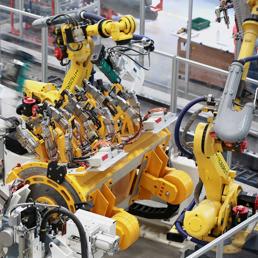 The Industry 4.0 tax incentive scheme approved in Italy by the government of former Prime Minister Matteo Renzi to boost investment in advanced technology will pay off in 2017. “I have already received the first orders from companies taking advantage of this scheme,” said Machine tools manufacturer Massimo Carboniero, who is also president of the machine tools industry trade group Ucimu. The new orders are being reported also by other industry players as companies rush to take advantage of a scheme that lets them amortize 250% of spending for high-tech products, the most powerful incentive for the growth of the machine tools sector.
The Industry 4.0 tax incentive scheme approved in Italy by the government of former Prime Minister Matteo Renzi to boost investment in advanced technology will pay off in 2017. “I have already received the first orders from companies taking advantage of this scheme,” said Machine tools manufacturer Massimo Carboniero, who is also president of the machine tools industry trade group Ucimu. The new orders are being reported also by other industry players as companies rush to take advantage of a scheme that lets them amortize 250% of spending for high-tech products, the most powerful incentive for the growth of the machine tools sector.
Based on this trend, Ucimu is optimistic about 2017, with domestic consumption of machine tools seen up 6.9%, and production projected to grow 4% to €5.7 billion, the record high reached in 2008. “After three consecutive years of double digit growth of the domestic market, we want to remain cautious, but as I look around and speak with our members, I am convinced that the growth rate of domestic demand will be higher by a large amount,” Carboniero said.
The recovery of the domestic market is the new trend in the industry, whose overall perimeter (services, tools, accessories, and components) exceeds a turnover of €8 billion. After years of stagnation, Italian consumption of robots has nearly doubled in just three years, benefiting especially domestic manufacturers. Production accelerated 5% to €5.48 billion in 2016, helped by the domestic market, with deliveries up 20.5% after the collapse of 2013. “Italy has started investing again and in 2017 the entire sector has a unique opportunity: taking advantage of the government plan for advanced technology,” said Carboniero. “The measures will give a further boost to demand of machinery and innovative technologies to digitize the factories.”
In 2017, UCIMU is planning training activities to teach businesses how to take advantage of the incentives, as part of a process that includes the presentation of business cases and a handbook prepared with the Ministry of Economic Development.
The double-digit growth of the domestic market, expected to be close to 2007 record levels, comes at the right moment, taking the baton from exports. A traditional driver of the machine tool industry, exports are expected to drop 3.3% in 2016, hurt by weakness in the emerging economies (BRIC). In the first nine months of the year, Brazil and Russia halved their orders of machinery and China is down around 10%.
Another weak market after years of growth is the United States, which has slipped behind Germany after the 9.1% drop in the January-September period. “The stop was inevitable in a year of presidential election, but we have already seen a reversal of the trend, which makes us optimistic about 2017,” Carboniero said.
In 2017, exports are expected to return to grow (up 1.7%) to hit €3.3 billion, according to Ucimu.



